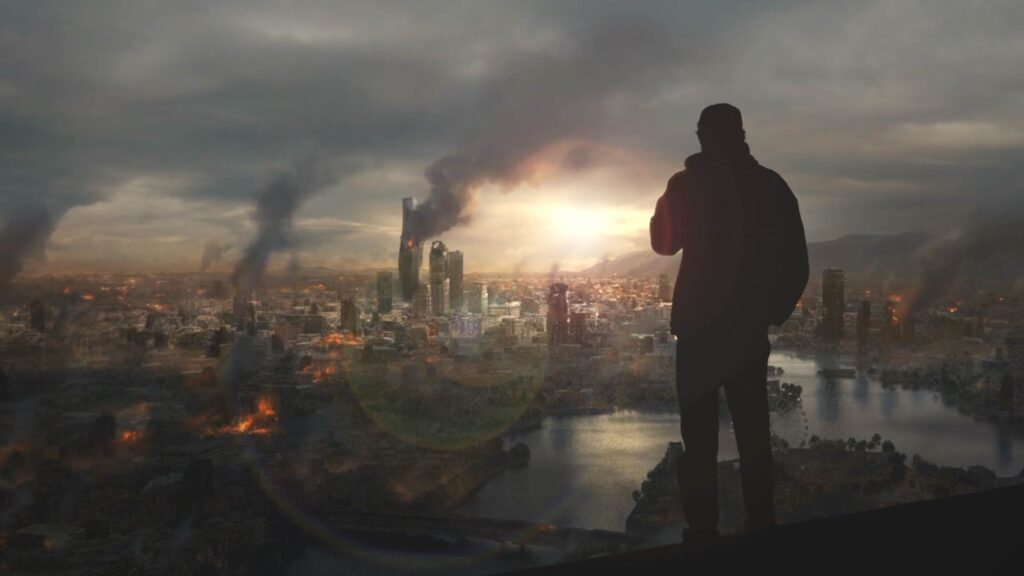Last man on Earth…The thought experiment of being the last person alive on Earth is as intriguing as it is haunting. It pushes us to ponder on profound questions about our existence, the legacy of humanity, and our relationship with the planet. This speculative scenario challenges us to consider how we would navigate a world devoid of human companionship, how we would manage resources, and what ethical considerations would guide our actions. It also invites us to reflect on the strategies for survival and the ultimate fate of the Earth itself.
Key Takeaways
- The psychological impact of solitude would be immense, requiring the last person to find ways to cope with the silence and isolation.
- Self-sufficiency would become crucial, as the last person would need to manage resources effectively to survive.
- Documenting the human experience may serve as a legacy, providing the last person with a purpose and preserving the memory of humanity.
- Ethical dilemmas would arise regarding the responsibility towards the planet and the choice of whether to continue the human race.
- Survival strategies would need to adapt to technological limitations and the necessity to preserve what remains of the abandoned Earth.
Contemplating Solitude: Life as the Sole Survivor
Navigating the Silence: The Psychological Impact
In the profound stillness of a world without others, the last person alive would face the daunting psychological landscape of extreme solitude. The silence would not just be a lack of noise, but a void of human presence, a condition that could lead to chronic loneliness. Chronic loneliness is not merely a state of mind; it has tangible, detrimental effects on physical health. Over time, higher cortisol levels can lead to a myriad of health issues, including high blood pressure, muscle weakness, and problems with concentration.
In this unprecedented solitude, the need for self-expression and emotional release might lead one to seek solace in creative outlets. Journaling, for instance, could become a vital practice for maintaining emotional wellness, serving as a silent confidant in the absence of human companionship.
While the need for human interaction is hardwired into our psychology, the last person on Earth would have to find alternative ways to cope with the isolation. Reaching out to the remnants of humanity, such as through old letters or recordings, could provide a semblance of connection. These artifacts of past relationships might become treasured possessions, echoing the voices of those who once were.
Resource Management and Self-Sufficiency
In the unprecedented scenario of being the last person on Earth, resource management and self-sufficiency become paramount. Without the infrastructure of society, the final human must adapt to a new way of living, one that is deeply intertwined with the environment. This lifestyle does not demand complete isolation but encourages a symbiotic relationship with the environment, where resources are mindfully utilized and replenished.
The key to survival lies not just in the accumulation of resources, but in the knowledge and skills to sustain oneself. Learning to grow food, purify water, and generate power are essential skills that would need to be honed.
Understanding the limits of the Earth’s bounty is crucial. A balance must be struck between consumption and conservation to ensure a lasting harmony. Here is a list of fundamental resources and considerations for managing them:
- Water: Securing a clean and reliable water source.
- Food: Cultivating crops and possibly foraging for wild edibles.
- Shelter: Maintaining a safe and durable living space.
- Energy: Harnessing renewable sources like solar or wind power.
- Health: Accessing medical supplies and knowledge for self-care.
In this solitary existence, the last human would embody the essence of Homesteading as a Lifestyle of Self-Sufficiency, where every action is deliberate and every resource is precious.
Creating a Legacy: Documenting the Human Experience
In the silence of a world without others, the last person alive holds a unique responsibility: to document the human experience. Creating a legacy becomes a solitary but significant endeavor. It’s not just about preserving one’s own story, but also about capturing the essence of humanity’s collective journey.
- Write about key events, people, and influences in your life.
- Reflect on personal growth and development.
- Be honest, introspective, and capture the stories that define human character.
In this unprecedented solitude, the act of documenting becomes a form of communion with the past and a gift to the unknown future.
Memories are the threads that connect the tapestry of human history. By writing down stories, whether in a diary, letters, or even recording audio and video messages, one ensures that the echoes of human life will not fade into oblivion. This act of preservation is a testament to the resilience and depth of the human spirit.
The Ethics of Extinction: Choices Facing Humanity

The Voluntary Human Extinction Movement: Ideals and Criticisms
The Voluntary Human Extinction Movement (VHEMT) presents a radical approach to environmentalism, advocating for the cessation of human reproduction to allow for the gradual voluntary extinction of humankind. This movement, founded by Les U. Knight, is rooted in the belief that the absence of humans would lead to the recovery of the Earth’s ecosystems and the prevention of further environmental degradation.
Critics of VHEMT argue that humans have the potential to develop sustainable lifestyles and can reduce their population to sustainable levels without resorting to extinction. They suggest that the movement overlooks the positive impacts humans can have on the planet and the possibility of coexisting with nature in a balanced way.
The core of VHEMT’s philosophy is that the end of human procreation would ultimately lead to a planet where nature flourishes without the pressures of human activity.
Supporters of the movement emphasize the reduction of human-caused suffering and the preservation of resources. However, the movement has faced scrutiny for its perceived disregard for human life and the ethical implications of advocating for human extinction.
Moral Obligations to the Planet and Future Generations
As the last person on Earth, the weight of moral obligations to the planet and its potential future inhabitants becomes a solitary burden. The concept of treating the lives and well-being of future generations as we wish to be treated ourselves emerges as a guiding principle. This duty of solidarity is not just a philosophical stance but is also echoed in global sustainability goals, such as addressing climate change to protect future lives.
The Voluntary Human Extinction Movement (VHEMT) posits that humans, especially those in First World countries, have a disproportionate impact on the planet’s resources. Their belief is that human existence, despite attempts at living environmentally friendly lives, has been ultimately destructive. VHEMT advocates argue that the most responsible course of action may be to cease procreation, thus preventing further human suffering and the potential extinction of other species.
In contemplating the end of humanity, one must consider the legacy left behind. The choices made in the present will echo in the geological strata of the Earth, serving as a testament to the final generation’s respect or disregard for the planet.
The debate over our moral obligations is complex, involving not just our species, but the myriad of others that share our planet. It raises the question of whether our final acts should aim to minimize our footprint, allowing the Earth to heal and other species to thrive in our absence.
The Debate Over Procreation in a Doomed World
In a world teetering on the brink of collapse, the question of whether to bring new life into existence becomes a profound ethical dilemma. Is it an act of hope or the ultimate hubris to procreate when the future is so uncertain? The Voluntary Human Extinction Movement (VHEMT) posits that ceasing reproduction is a necessary step towards preventing further environmental degradation and human suffering. Their philosophy hinges on the belief that human extinction would be an altruistic choice, allowing the Earth to recover from the damage wrought by humanity.
However, critics argue that the human spirit is resilient and capable of overcoming great challenges. They suggest that limiting family size, rather than abstaining from procreation entirely, could be a more balanced approach. Adoption and foster care are also presented as viable alternatives for those who yearn for parenthood without adding to the population.
The debate is not merely about survival, but about the kind of legacy we wish to leave behind. It’s a question of balancing our innate drive to continue our lineage with the responsibility we hold towards our planet and its future inhabitants.
The table below summarizes the contrasting perspectives on procreation in a world facing potential doom:
| Perspective | Procreation Stance | Reasoning |
|---|---|---|
| VHEMT | Against | Prevent suffering, environmental recovery |
| Critics | Limited/Alternative | Human resilience, problem-solving, adoption |
Survival Strategies: Adapting to an Empty World

Finding Purpose in Isolation
In the profound silence of a world without others, the last person alive might grapple with the existential weight of solitude. Finding purpose becomes not just a means of survival, but a form of resistance against the encroaching void. Crafting a daily routine can anchor one’s sense of normalcy, where activities like gardening, reading, or even simple maintenance tasks become sacred rituals in preserving the human spirit.
In the absence of societal expectations, the last human has the unique opportunity to redefine what is meaningful. This could involve reconnecting with nature, delving into creative pursuits, or documenting the remnants of civilization.
Reaching out to the past may also serve as a comfort, as the benefits of journaling or engaging with personal mementos can provide a tangible link to the once vibrant human narrative. The table below outlines potential activities and their psychological benefits:
| Activity | Psychological Benefit |
|---|---|
| Journaling | Emotional wellness |
| Gardening | Connection to nature |
| Reading | Cognitive health |
Ultimately, the quest for purpose in an empty world is a deeply personal journey, one that may lead the last person to unexpected discoveries about themselves and the legacy they choose to leave behind.
Technological Reliance and Its Limitations
In the absence of a bustling human society, the last person on Earth would find themselves in a paradoxical relationship with technology. On one hand, the abundance of technological resources could seem like a boon. From automated systems managing basic utilities to advanced healthcare equipment, the remnants of our technological age could provide significant support for the lone survivor.
However, the limitations of this reliance quickly become apparent. Without the infrastructure of a society to maintain and repair these systems, even the most robust technologies would eventually fail. A list of common technological systems and their potential fail points illustrates this precarious dependency:
- Power grids: susceptible to failure without constant maintenance
- Water purification: reliant on chemical supplies and machinery
- Communication networks: degrade without upkeep, leaving the survivor isolated
- Healthcare technology: complex devices that require specialized knowledge to operate
In this scenario, the survivor must balance the use of technology with the inevitability of its decline, learning to adapt and prepare for a life that may become increasingly primitive over time.
The challenge is not only to use the existing technology wisely but also to foresee a future where it might no longer be available. The survivor’s ingenuity and ability to revert to more basic survival skills will be paramount in navigating a world where technology can no longer be taken for granted.
Exploring and Preserving the Abandoned Earth
In the eerie quiet of a world without others, the last person alive would face the profound task of exploring and preserving the remnants of civilization. The responsibility to document and safeguard the echoes of human existence would fall on solitary shoulders. This mission could involve cataloging artifacts, maintaining significant structures, and perhaps even creating a repository of human knowledge and culture.
- Cataloging artifacts from different cultures and eras.
- Maintaining and securing historically significant structures.
- Creating a digital or physical repository of human knowledge.
In this unprecedented solitude, the acts of exploration and preservation become not just a means to pass time, but a profound connection to the collective memory of humanity. The last person would curate the final exhibition of human history, a gallery of achievements, failures, dreams, and realities.
While the physical task of preservation is daunting, the psychological weight of being the sole archivist of Earth’s legacy is immense. The last person would need to decide what is worth saving and what can be let go, a decision that carries the weight of all who came before.
The Final Countdown: Preparing for Earth’s Inevitable Demise

Understanding the Scientific Predictions
When we consider the end of Earth, it’s essential to ground our predictions in science. The various models and theories about global catastrophe scenarios, from climate change to asteroid impacts, provide a framework for understanding the potential timelines and causes of Earth’s demise. While some scenarios are more likely than others, they all converge on the certainty that Earth will not last forever.
- Models like the extinction vortex and concepts such as the extinction threshold help us grasp the complexity of factors that could lead to Earth’s end.
- Causes such as climate variability, genetic erosion, and human impact outline the multitude of threats our planet faces.
In the grand scheme of the universe, Earth’s expiration is a given, but the exact path to that end remains a subject of study and debate.
According to the IPCC scenarios, even the most pessimistic ones predict temperatures compatible with human survival. The question of human extinction under these conditions is not immediate, but the long-term outlook is less certain. The scientific community continues to explore the boundaries of our planet’s resilience and the limits of human adaptability.
Embracing the End: The Concept of ‘Living Funerals’
In the face of Earth’s inevitable demise, the concept of ‘living funerals’ offers a poignant way to confront mortality. These ceremonies allow individuals to celebrate life, share memories, and express love and gratitude before the end. Unlike traditional funerals, living funerals are attended by the honoree, creating a space for meaningful exchanges and closure.
As the last person on Earth, a living funeral might take on a new dimension. It becomes a solitary ritual, a final act of self-recognition and acceptance of one’s place in the history of the world.
While the idea may seem unconventional, it can be a powerful tool for healing and peace. Here are some ways one might embrace this concept:
- Reflecting on personal achievements and experiences
- Recording messages or letters to the unknown future
- Creating a time capsule or a digital archive of one’s life
Ultimately, the act of holding a ‘living funeral’ is a deeply personal choice, one that acknowledges the transient nature of existence and the importance of saying goodbye on one’s own terms.
Leaving a Mark: Should We Attempt to Signal Our Existence to the Cosmos?
In the face of Earth’s inevitable demise, the question arises: Should we attempt to signal our existence to the cosmos? This act would serve as a time capsule, a final note from a species that once thrived on a vibrant planet. It’s a gesture of defiance against the void, a message that says, ‘We were here.’
- Consider the Voyager Golden Records, which carry sounds and images intended to portray the diversity of life and culture on Earth.
- Ponder the Arecibo message, a brief binary statement about human existence sent into space in 1974.
The desire to leave a mark is deeply ingrained in our psyche, a testament to our yearning for legacy and remembrance.
Yet, the practicality of such endeavors is debatable. The vastness of space and the uncertainty of life beyond our solar system raise the question of whether our signals will ever be received. Moreover, the forms that alien languages might take and our ability to understand them remain a subject of scientific investigation.
Embracing the Inevitable Solitude
In contemplating the profound solitude of being the last person alive on Earth, we are faced with a mirror reflecting the fragility of our existence and the impermanence of the world we know. This thought experiment not only challenges us to consider our individual and collective impact on the planet but also to ponder the legacy we wish to leave behind. Whether through the cessation of procreation as proposed by the Voluntary Human Extinction Movement or the pursuit of interstellar travel to ensure the survival of our species, the choices we make today echo into the future. As we imagine the end-of-life party for humanity, we are reminded to cherish the present, to protect our environment, and to celebrate the stories and memories that define us. Ultimately, the last person on Earth symbolizes a call to action—a reminder that our time is finite and that we must strive to make the most of it, for ourselves and for the generations that may or may not follow.
Frequently Asked Questions
How will the Earth ultimately meet its demise?
Scientifically, the Earth’s end is seen as an inevitability. It could either be engulfed and destroyed by the Sun during its red giant phase or be ejected into space to become a frozen rogue planet. The exact fate of Earth is uncertain, but it will not happen for billions of years.
What does the Voluntary Human Extinction Movement (VHEMT) advocate?
VHEMT advocates for the gradual voluntary cessation of human reproduction to allow the Earth’s biosphere to return to good health. They argue that human absence would prevent environmental destruction and suffering, with members feeling a moral duty to protect the planet.
What is a ‘living funeral’ and why might someone have one?
A ‘living funeral’ is a gathering where someone who is nearing the end of life celebrates with loved ones. It’s a chance to share memories, express gratitude, and say farewells while the person is still alive, making peace with the imminent end.
How do critics respond to VHEMT and similar ideologies?
Critics argue that humans are capable of change and can address the problems facing the Earth through active agency. They challenge the movement’s more fatalistic views and believe in human potential to solve environmental issues.
Is it ethical to continue procreating in a world facing potential doom?
This is a contentious ethical debate. Some argue that procreation under such circumstances is irresponsible and leads to further strain on the planet, while others believe in the intrinsic value of human life and the potential for future generations to overcome challenges.
Should humanity attempt to signal its existence to extraterrestrial life as the end approaches?
This is a philosophical question about the legacy of humankind. Some believe that sending a message to the cosmos would be a final testament to our existence, while others question the purpose and potential consequences of such an action.







